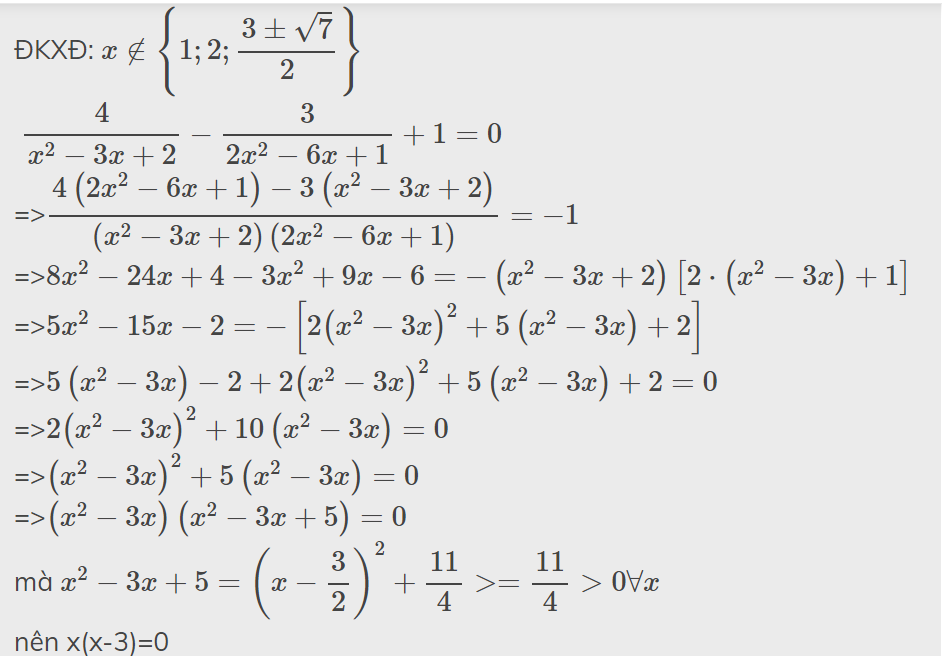4x^2(y^2)-7x^2+7y^2 = n^2
Chứng minh x = y với x,y,n nguyên dương
Hãy nhập câu hỏi của bạn vào đây, nếu là tài khoản VIP, bạn sẽ được ưu tiên trả lời.


A = a(b² + c²) + b(a² + c²) + c(a² + b²) + 3abc
= ab² + ac² + a²b + bc² + a²c + b²c + 3abc
= (ab² + a²b + abc) + (a²c + ac² + abc) + (b²c + bc² + abc)
= ab(a + b + c) + ac(a + c + b) + bc(b + c + a)
= (a + b + c)(ab + ac + bc)

\(22\cdot321+22\cdot456+11\cdot446\)
\(=22\cdot\left(321+456\right)+22\cdot223\)
\(=22\cdot777+22\cdot223=22\cdot1000=22000\)

\(x\left(x-5\right)+3\left(x-5\right)=0\\ \Leftrightarrow\left(x-5\right)\left(x+3\right)=0\\ \Rightarrow\left[{}\begin{matrix}x-5=0\\x+3=0\end{matrix}\right.\Leftrightarrow\left[{}\begin{matrix}x=5\\x=-3\end{matrix}\right.\)
Vậy tập nghiệm pt là: \(S=\left\{5;-3\right\}\)
x(x-5)+3(x-5)=0
=>(x-5)(x+3)=0
=>\(\left[{}\begin{matrix}x-5=0\\x+3=0\end{matrix}\right.\Leftrightarrow\left[{}\begin{matrix}x=5\\x=-3\end{matrix}\right.\)

\(2x^3+10x^2=0\)
=>\(2x^2\left(x+5\right)=0\)
=>\(x^2\left(x+5\right)=0\)(Vì 2>0)
=>\(\left[{}\begin{matrix}x^2=0\\x+5=0\end{matrix}\right.\Leftrightarrow\left[{}\begin{matrix}x=0\\x=-5\end{matrix}\right.\)
\(2x^3+10x^2=0\Leftrightarrow x^2\left(2x+10\right)=0\Leftrightarrow\left[{}\begin{matrix}x=0\\x=-5\end{matrix}\right.\)

`x^2-6x=0`
`<=>x(x-6)=0`
TH1: `x =0 `
TH2: `x - 6=0<=>x=6`
Vậy: ...
\(x^2-6x=0\Leftrightarrow x\left(x-6\right)=0\Leftrightarrow\left[{}\begin{matrix}x=0\\x=6\end{matrix}\right.\)

Đặt \(x^2+3x=t\)
\(\left(t+1\right)\left(t-3\right)-5=t^2-2t-8=\left(t-1\right)^2-9=\left(t-4\right)\left(t+2\right)\)
\(\Rightarrow\left(x^2+3x-4\right)\left(x^2+3x+2\right)=\left(x-1\right)\left(x+4\right)\left(x+1\right)\left(x+2\right)\)
\(\left(x^2+3x+1\right)\left(x^2+3x-3\right)-5\\ =\left(x^2+3x-1+2\right)\left(x^2+3x-1-2\right)-5\\ =\left(x^2+3x-1\right)^2-2^2-5\\ =\left(x^2+3x-1\right)^2-3^2\\ =\left(x^2+3x-1-3\right)\left(x^2+3x-1+3\right)\\ =\left(x^2+3x-4\right)\left(x^2+3x+2\right)\\ =\left(x-1\right)\left(x+4\right)\left(x+1\right)\left(x+2\right)\)

a; \(x^2\) - 6\(x\) + 8
= \(x^2\) - 2\(x\) - 4\(x\) + 8
= (\(x^2\) - 2\(x\)) - (4\(x\) - 8)
= \(x\)(\(x\) - 2) - 4(\(x\) - 2)
= (\(x-2\))(\(x\) - 4)
4\(x^2\) + 4\(x\) - 3
= 4\(x^2\) - 2\(x\) + 6\(x\) - 3
= (4\(x^2\) - 2\(x\)) + (6\(x\) - 3)
= 2\(x\)(2\(x\) - 1) + 3(2\(x\) - 1)
= (2\(x\) - 1)(2\(x\) + 3)





